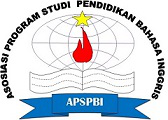Logical fallacy in speakers’ arguments: what do we learn from final round debate of NUDC
Abstract
In debate, speakers often employ logical fallacies to bolster their statements in order to secure victory by persuasively introducing a collection of factual or belief errors. Numerous studies have analyzed the use of logical fallacies, primarily in presidential debates and public figures’ speeches. However, there has been limited research specifically investigating the logical fallacies in students' debates. Therefore, this research aimed to examine the arguments presented by the speakers in the final round debate at NUDC. The objective is to identify and categorize the logical fallacies present in the arguments. The study employed descriptive-qualitative method. The data was taken from recorded video and transcript of the argument featuring eight speakers among NUDC’s finalists. The data are reduced and organized into arguments containing only logical fallacies. They are classified into Damer’s category of arguments. The study reveals that eight fallacies were identified. The most prevalent types of fallacies were those that violated the relevant criterion. Meanwhile, the most frequently occurred fallacy types are manipulation of emotion, appeal to common opinion, and causal oversimplification. The findings suggest that students should be taught to construct effective arguments that are based on evidence and logic, rather than relying on emotional appeals or popular opinions.
Full Text:
PDFReferences
Ali, Muhammad Z. F., Faridi, A., & Sakhiyya, Z. (2021). Performance of Critical Thinking and Existence of Logical Fallacies in Indonesian Varsity English Debate 2020 in Jakarta. The International Journal of High Education Scientists, 1-12.
Bierman, A. K., & Assali, R. N. (1996). The critical thinking handbook. New Jersey: Prentice Hall.
Cresswell, J. (2012). Educational Research: Planning, Conducting and
Evaluating Quantitative and Qualitaive Research. Pearson Education. Inc.
Dale, P., & Wolf, J. C. (2000). Speech communication made simple. NY: Miami-Dade Community College.
Damer, T. E. (2009). Attacking Faulty Reasoning Sixth Edition (A Practical Guide to Fallacy-Free Arguments (6th ed). United States of America: Wadsworth Cengage Learning.
Eemeren, F. et al. (2002). Argumentation, Analysis, Evaluation, Presentation. New Jearsey: Lawrence Erlbaum Associates, Inc.
Emeren, F. (2010). Strategic Maneuvering in Argumentative Discourse.
Amsterdam: John Benjamin Publishing Company.
Freely, A. J. (1969). Argumentation and debate (2nd ed.). Belmont: Wadsworth Publishing Company.
Freely, A. J. and Steinberg, D. L. (2009). Argumentation and debate: critical thinking for reasoned decision making (12th ed.). Boston, MA: Wadsworth Cengage Learning.
Gula, R. J. (2002). Nonsense: A handbook of logical fallacies. Axios Press.
Inch, E. S., & Warnick, B. (2011). Critical thinking and communication: the use of reason in argument (6th ed.). Boston: Pearson.
Kennedy, R. (2007). In-class debate: Fertile ground for active learning and the cultivation of critical thinking and oral communication skills. International Journal of Teaching and Learning in Higher Education, 42-44.
Krieger, D. (2005). Teaching debate to ESL students: A six-class unit. The
internet TESL journal, 11(2), 25-45.
Ristawati, R. (2019). Student’s perception on joining English debate program toward the student’s critical thinking ability. Published Dissertation. Gresik: Universitas Muhammadiyah Gresik.
Smith, N. H. (2011). Practical Guide to Debating World Style. New York: International Debate Education Association.
Udayana TV. (2022, September 16). [NUDC 2022] Grand Final - Airlangga vs ITB vs Gadjah Mada vs Diponegoro [Video]. YouTube. https://youtube.com/live/7wjlX7Vmoso?si=SQp-IrK2lCeh46eE
Wallen, N. E., Hyun, H. H. and Fraenkel, J. R. (2015). How to Design and Evaluate Research in Education (9th Ed.) New York: McGraw-Hill.
Warman, J.S & Hamzah. (2019). An Analysis of Logical Fallacy on Joko Widodo's Arguments during 2019 Indonesia Presidential Debate. E-Journal of English Language & Literature, 77-82.
Wiranda, A., & Hamzah. (2022). Analysis of Logical Fallacy on the Arguments Made by Student from 2019 Indonesian Protest and Riots in Television Debates. E-Journal of English Language & Literature , 323-327.
Zhou, Z. C. (2018). The logical fallacies in political discourse. Summer Research Program. 5.
DOI: http://dx.doi.org/10.20527/jetall.v7i2.20713
Article Metrics
Abstract view : 61 timesPDF - 50 times
Refbacks
This journal is indexed in:


This Journal is listed in:
 Journal of English Teaching, Applied Linguistics and Literatures (JETALL)
Journal of English Teaching, Applied Linguistics and Literatures (JETALL)








.png)



1.png)
